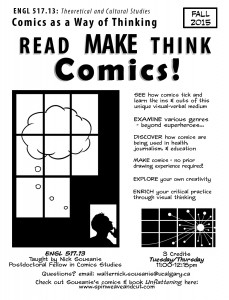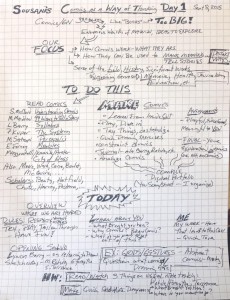Excited to be back in the classroom with
Comics as a Way of Thinking at the University of Calgary! See below for my thoughts on it – but first, a bunch of news from August. Really brilliant and insightful review conversation of
Unflattening by Peter Wilkins & Damon Herd on
The Comics Grid. An excerpt:
[Unflattening] is attempting to establish a beach-head for a paradigm of using drawing (or looking at drawings) as a way of thinking that adds a dimension to thinking only with words … a manual for life for both Sousanis’ daughter and for the reader, to help us be aware of the many different ways of seeing. … an aesthetic object as well as a theoretical exploration. It is a beautiful book to hold and to look at. (Full
review here.)
Some
speaking news: On Sunday September 20th at 11am, I’m excited to be a guest of the
Brooklyn Book Festival! I’m doing a session titled
Look and Listen: Stories of the Senses alongside
Jessica Abel, who will be sharing from her new book on radio stories Out On the Wire and moderated by
Alex Blumberg of Gimlet Media, formerly This American Life. Details
here! The next day, Monday September 21, I’ll be at Teachers College, Columbia University for a
book talk in the Russell Library. More on these and other events out East posted soon. Related, I recently did an interview for
Teachers College Arts & Humanities site. Also, coming in October, I’ll be a
guest at the Texas Bookfest! Details still to be announced. And meanwhile, if you happen to be in the Netherlands, the work is on display as part of the
Graphic Design Festival Breda: Public Library. (My profile
page on GDFB)
-

-

-
My sketch-note from Day 1
So this fall, I’m thrilled to be teaching
Comics as a Way of Thinking. Our purpose is to explore comics as a powerful form of communication by making comics, reading comics, and studying comics theory. We’ll also do things like Sketch-note and other explorations that get them considering other ways or organizing their thoughts. I find I learn the most by teaching – I have to make sense of my thoughts to share with others, and their questions and interests prod me to dig deeper, look in other directions, and always make me rethink things. Unflattening very much came out of the courses I taught around comics and the questions around education that having those conversations raised. I feel like a class is a group to learn with – and having met this new class once already, a mix of English students and computer science/data visualization researchers, I’m really excited for where we’ll go together! They’ve made their first drawings in class and we’ll be doing more most days and out of class as well. I’m not sure exactly what I’ll be able to share in terms of their work with a broader public, but I made a public page for
the course here and I’ll be updating it as we go, and sharing more as I can. Below, i’ve shared a bit of the course description, but all of that can be found on the
site page (and see
here for all kinds of
resources on comics and education). Thanks for following along… – Nick
This course will explore comics as a unique and robust communication form, with an emphasis on understanding comics by making them. We will take a multifaceted approach to analyzing the medium, from uncovering comics’ historical roots and examining the various genres developed in the West and across the globe, to delving into the theoretical and formal elements, as well as considerations of comics in relation to other media such as film, poetry, and even architecture. Beyond narratives, we will look at the growing role comics are playing in the fields of journalism, education, and health/medicine. While making comics will be a significant component of the course, prior drawing experience is not required. Rather, we will expand upon what drawing means by creating spaces for students to play and explore the multiplicity of possibilities that emerge when we work in the bilingual fashion that comics facilitate. The course will serve as a springboard for students to develop ways to incorporate visual practices gleaned from comics into their own creative and critical work.
Briefly on my teaching philosophy: I consider learning as acquiring the tools to follow one’s own curiosity, and thus teaching means providing a framework, establishing an environment for participants to explore and thrive. Rather than being out in front, I see my role as accompanying students on a journey we all make together. As a class, we all come from different backgrounds and offer distinct vantage points – we want to draw on all of them to expand the possibilities for what we can all learn as we each find our own way. I want to emphasize the importance of play as a form of learning – that doesn’t mean it’s not hard work, it’s that we learn by doing, by trying, by falling, by diving in with vigor and seeing what happens.



